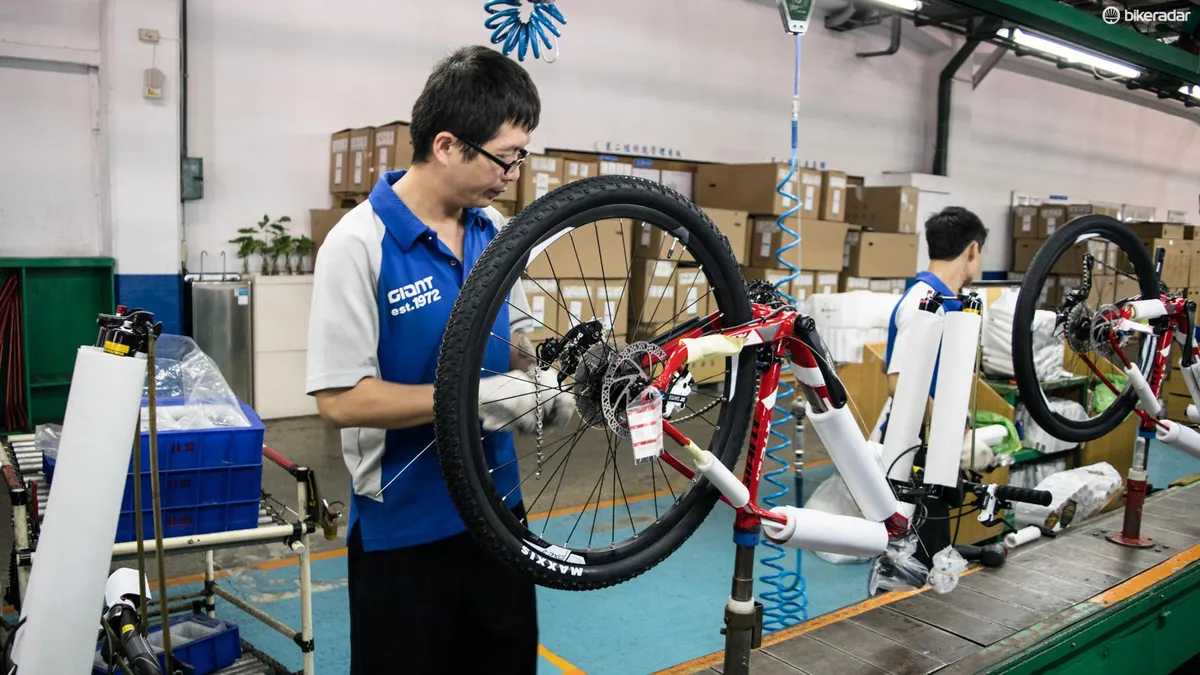Consumers in Western countries have grown very used to the idea that few of the products we use are manufactured at home. Indeed, ‘we don’t make things anymore’ is a refrain (or a lament) often heard in discussions of where we are politically.
Purportedly Italian bikes like the Colnago V5Rs and Pinarello Dogma F are designed in Italy, but their frames are made in Taiwan or China. It’s a similar story with major North American brands such as Specialized, Trek, Cannondale and Cervélo.
The designs are unique to their brands, and I’m not looking to denigrate the efforts that go into developing them. But in many cases the actual manufacturing techniques barely differ between brands. It’s valid to interrogate the value proposition when you’re paying significantly more for something with a ‘prestige’ name on the downtube.
What even gives a bike its national identity? Is there some inherent Italian-ness or American-ness that goes beyond design? Do you care whether your bike is built by factory workers in Asia rather than Wisconsin or Cambiago?
We have more choices in bikes than ever before, but because of how the industry operates, the differences between brands sometimes feel more emotional than tangible.
- How Trump’s tariffs are causing chaos in the cycling industry
- EU extends Chinese import duties to safeguard ebike industry
No, they’re not all the same

‘That guy’ on your group ride will insist that all carbon bikes are made in the same factory, and that the ubiquitous looky-likey frames available for a few hundred dollars on AliExpress are just as good (or indeed the same) as the brand-name ones sold in your LBS.
That’s not true – in reality, the origins of these ultra-cheap frames are extremely murky. But there is a grain of truth there inasmuch as modern manufacturing depends heavily on OEMs (Original Equipment Manufacturers), and certain OEMs make bikes for large numbers of different brands.
While I cannot say with certainty exactly which models are made by whom, I watched Treks, Scotts, and Colnagos roll off the production line at Giant’s factory in Taichung on a press tour in 2015.
The picture may have changed since then, but Giant remains the world's biggest bike maker, and no doubt similar scenes still play out at rival plants belonging to less well-known manufacturers.
When shopping for a high-end carbon bike with a monocoque frame, you pay a huge premium for traditional European ‘prestige’ brands, or similar North American makes. To varying extents, almost all of them make use of outsourced Asian manufacturing.
If an Italian superbike that costs as much as a lightly-used family car is manufactured in the same factory as more mainstream, affordable machines using similar techniques, can its cost be justified?
Bike frames are relatively simple objects and unlike, say, cars. The differences between high-end competing models often come down to minor design decisions rather than radically different construction methods or materials.

This is particularly true of top-end road bikes, where the recipe for lightweight monocoque design is fairly well understood, and it’s up to designers to try and inject some brand identity with fanciful shapes, slicker component integration or a nice paint job.
It's also worth noting that brands don't look to Taiwan simply because the cost of labour there is lower than in Europe. It's also where much of the expertise resides – if you want cutting-edge moulded carbon, it's the place to be.
A thorny issue – the 'who' as well as the 'where'

There is a further consideration, and it touches on some very delicate issues. Deep down, would you prefer your bike to be made by a European factory worker rather than an Asian one?
From one perspective, it shouldn’t matter at all – as the Radavist’s John Watson points out, most bikes are handmade.
Saying that, I sense there’s a perception that a bike built by Italian factory workers is somehow more authentic than one put together in Taichung.
Bikes are just objects onto which we project our feelings, and any notion of baked-in qualities like passion and flair (the top two Italian bike review clichés) reflect our prejudices rather than anything meaningful.
Authenticity is one thing, but there may be more practical considerations at play.
It doesn’t feel unreasonable to say ‘I would like to buy a bike built in my country because that means someone here has a job making it, and the money I spend benefits my local economy, rather than that of another country’.
US brand Allied Cycle Works made hay from its MUSA (‘made in USA’) credentials when it first launched in 2016. But in 2025, the company moved its frame production to Asia. Like many brands, it still carries out extensive QC and finishing work at its home base, but the business of laying up carbon happens abroad.
In itself, that’s not a remarkable move, but when a brand makes local manufacturing a central part of its story, some portion of potential buyers will be unhappy.
In Allied’s case, CEO Drew Medlock told Bicycle Retailer and Industry News that the move was deemed necessary to be competitive with the big players, noting that the brand’s market segment was generally more focused on “performance, quality, value and athlete endorsements”, rather than where the bikes are made.
Regardless of where you stand, it’s entirely reasonable to debate the value of branding. At what point does a brand give up too much of its identity, and will the companies who outsource their manufacturing ultimately lose out?
Could change be afoot?

Cheaper Asian manufacturing has been the status quo for so long now that it’s easy to assume that will never change, but it conceivably could.
In the US, newly introduced tariffs on foreign-made goods are pushing bike prices up. In the short term, the rapidly changing situation and uncertainty are causing chaos and placing parts of the bike industry in real peril, but what about the long-term?
Even before the introduction of tariffs, changing political climates and a desire to be less reliant on foreign goods and less vulnerable to supply chain disruption have seen greater investment in homegrown manufacturing.
In Europe, initiatives like the UK’s Made Smarter, Italy’s Industria 4.0, and France Relance aim to increase their countries’ competitiveness in manufacturing using a combination of incentives and funding for innovation.
If outsourcing production stops making economic or political sense, bike manufacturing might conceivably return to Europe and North America – what’s known as reshoring as opposed to offshoring.
That kind of change takes years though – it’s a far more complex proposition than simply building factories when the know-how to build high-end carbon frames is largely concentrated abroad.
I do and don’t care where my bike is made

While a fixation on locally-made products can sometimes veer into jingoism, I’m as drawn to good stories as any bike buyer.
The idea of a self-contained bike brand doing everything in-house is inherently charming. It’s why people still spend thousands on a Moots titanium gravel bike, and the made-in-Italy Colnago C68 retains a cachet that the V5Rs has undeniably lost.
In reality, however, if you want the best-performing bike for your money in 2025, made by the factories with the greatest expertise in their field, a good story alone doesn’t cut it.


